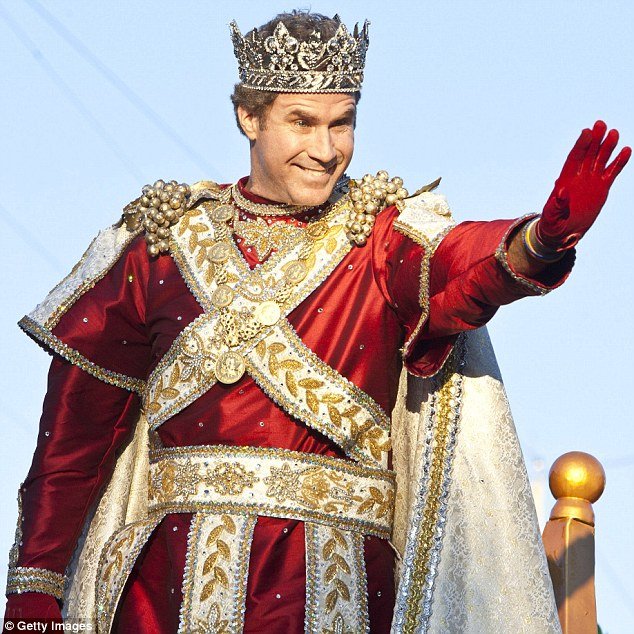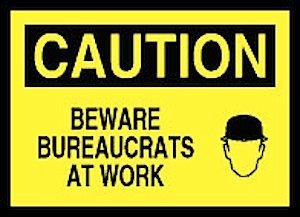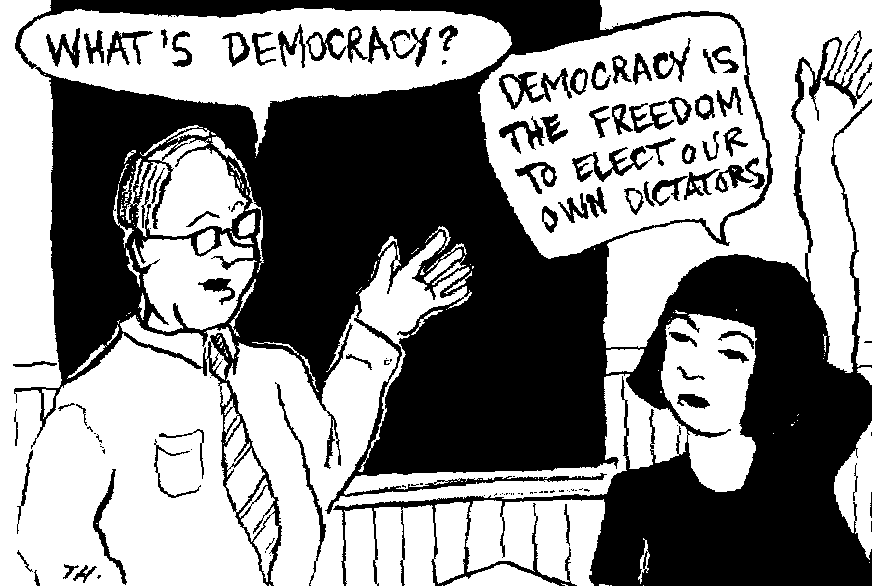Every society or community consisting of thousands individual's needs a consensus mechanism to resolve disputes. Smaller communities can rely on social pressure and shunning because “everyone knows everyone”. Once a community grows beyond a certain size shunning loses its power because people simply move on and start over with a blank reputation.
In a world where it is impossible to know everyone, it becomes critical to have some means of managing reputation that “everyone” implicitly trusts and that “no one” can escape. Governments are a means of reaching consensus on who owns what and who is in good standing or bad standing, and what behaviors are socially acceptable.
When we meet a random stranger we know that they “aren’t in jail” which means we can infer that they are most likely in “good standing” or at the very least, there is insufficient evidence of wrongdoing. We also know that any property or money they have is based upon a presumption that the courts have settled all litigated disputes and the individual has complied with the judgment. Failure to comply would place the individual in contempt and therefore in jail.
The primary purpose of our governments is to establish consensus on who is “good”, who is “bad”, and “who owns what”. This is a task that is so massive that no individual is able to judge for herself the best outcome of every dispute. It is a task that must be delegated and shared to some system of governance.
King’s Consensus

The original consensus process was to allow a king to make the final judgment on everything. This form of government is incredibly centralized and is often decided based upon the principle that “might makes right”.
These systems naturally self-select the individuals who are most cunning, manipulative, and capable of compelling loyalty out of respect, fear or both. It has been said that a benevolent dictator is the best form of government. Unfortunately, even the most benevolent dictator is human and suffers from biases, lack of information, logic errors, and deception.
Give the most humble, honest, and intelligent man on earth the job of being supreme dictator of the world and he will be unable to process enough information to micromanage human affairs for the benefit of all. If such an individual also possessed wisdom, he would know his own limitations and refrain from interfering unless he was certain.
Bureaucratic Consensus

A king will grow tired of hearing everyone’s dispute, so he will appoint trusted judges who will oversee one or more courts. These courts when overloaded will appoint lower courts until the base of the pyramid is capable of hearing and resolving all disputes. To aid in resolving disputes the king may publish his opinion on everything under the sun. These opinions become laws when they are used by the courts to resolve disputes.
A wise king will realize that he does not know enough to publish opinions on everything, so he appoints czars to express opinions over different domains. The proclamations of the czars become law.
This process may involve thousands of people performing many different roles, but ultimately all power flows down from the top. The outcome may be chaotic, unpredictable, and rife with internal contradiction, but it is all ultimately under the control of the king.
Democracy

Democracy is the process by which a king may be selected. The best possible outcome is the election of a benevolent king who is intelligent and wise. This outcome is impossible, because anyone who was wise, intelligent, and benevolent would never seek out the position. Instead, the people will elect someone who tells them what they want to hear and then does whatever he or she wants to do once in power.
Democracy does not create decentralized governance, it merely decentralizes the decision over who will be king. Once a decision is made all governance is once again centralized.
Senate, Congress and Parliament are not Decentralized

In an effort to achieve “separation of powers” the framers of many government constitutions create different branches of government and establish committees of elected officials to make decisions.
Rather than look at the “top” of this pyramid which (in the United States) consists of about 600 people, we can look at the bottom rung of the pyramid. Each Senator, Congressman, or Supreme Court Judge is like a democratic kingdom ruling over millions of people. Congress is therefore similar to a smaller scale United Nations.
The theory is that this process provides checks and balances because no senator has power on his own, but must reach consensus with the rest of the elected politicians. If you view this political class as a small town you realize that they all share a commonality and everyone knows everyone. An informal reputation based small-town governance is established among the political elite. Those informal leaders (heads of political parties) effectively govern the behavior of all the top elected positions.
The result is once again “top down” power. It doesn’t matter what any individual senator wants, he is under extreme social/political pressure from above that overrides any democratic pressure from below. Even without pressure from above, the senators collectively lack the wisdom, intelligence, and information necessary to make good decisions. If one king is unable to manage decisions for millions of people under him, how can he possibly make decisions on how to vote in congress?
Wisdom of the Crowd

When information is widely distributed in a population of individuals the crowd’s aggregate opinion is often more accurate than that of any single expert. Whether the task is estimating the number of Jelly Beans in a jar, predicting the outcome of a sporting event or the future demand for goods and service, the more people involved the more accurate the result. This is the foundation of free market economies and how all prices are established. Free markets and voluntary exchange are able to effectively coordinate the activities of billions of people to produce goods and services so complex that no individual could ever hope to compete.
Decentralized Decision Making
It is through the process of decentralized decision making that the wisdom of the crowds is able to achieve its incredible results. Making a decision requires taking an action and being accountable for the outcome of that action.
In economic terms we say that a person's true opinion can only be measured by their actions. There is often a huge disconnect between someone's professed opinion and the actions they take. You may want to publicly express the opinion that gravity is a myth, but when you refuse to jump off a cliff your actions reveal the truth. There are real consequences for ignoring gravity when making decisions, but there are no consequences for ignoring gravity when expressing an opinion on gravity.
The free market (voluntary exchange) works as a decentralized decision making system because it forces all participants to act with their true beliefs. If the beliefs are justified they will profit and their power to act in the market will increase. If the beliefs are unjustified they will take a loss and their market power will be diminished.
Elections are expressing an opinion, but opinions are not the same as decisions. A decision involves taking responsibility for an action and its consequences. If all you do is express an opinion but take no responsibility then you have not truly acted. A politician will always act in the way that maximizes their own well being. Only things that impact the perceived profit or loss to a politician will have an impact on his actions. In this case I mean profit and loss in a very general sense… profit may mean fame, fortune, power, or respect.
Decentralized Governance
To build a system of decentralized governance all people must have some direct control over the allocation of public resources, the editing of laws, and the rendering of opinion. Furthermore, all people must take a risk of loss with every act of governance they take. Without the risk of loss no true measurement of value can be made and no opinion can be trusted. You cannot even trust your own opinion unless you take actions that risk personal loss if your opinion is out of alignment with reality. The greater the risk you are willing to take the stronger your faith in your opinion and the greater your resulting profit or loss will be.
It is through the iterative process of taking risks and realizing profit and loss that truth can be distilled from the mass of dissenting opinions. Those who act wisely grow in influence, those who act poorly shrink. Overtime the darwinian process of survival of the fittest takes over and the aggregate outcome of the governance improves in quality, quantity, and efficiency just like what happens in the free market.
There are two key elements to decentralized decision making:
- Each individual gets to take direct action to effect change
- Each individual is exposed to the risk of profit and loss as a result of their action
This plays out in the market with price discovery. Anyone who wants to do something buys the resources they require to make it happen. The result of their direct action is to simultaneously make something happen and expose them to the risk of profit and loss. If the value they realize from making it happen is greater than the cost of the resources consumed then they profit, otherwise they lose.
The goal of decentralized governance is to reach a “consensus opinion” on everything. Wikipedia is a close approximation. Imagine if all the laws of the land were maintained on a giant wiki along with everyone’s criminal record. A decentralized government would allow everyone the ability to edit everything provided they took a financial risk. A decentralized government would allow everyone to spend some money from the treasury and to make some decisions on who to tax. So long as every act of spending, taxation, and revision of the laws carried with it the potential for economic gain and loss tied to whether or not those actions were in alignment with public opinion then market forces and social pressure should produce a truly voluntary, non-violent, and decentralized governance.
Unfortunately, wikipedia adopts a hierarchical and centralized governance model. New systems will need to be developed to support a truly decentralized governance model over the wiki editing permissions.
